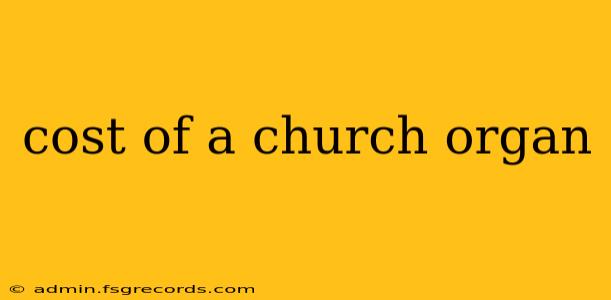The majestic sound of a pipe organ echoing through a church is a powerful and timeless experience. But the beauty of these instruments comes at a price. The cost of a church organ varies dramatically, depending on a multitude of factors. This guide will delve into the key elements influencing the final price tag, helping you understand the investment involved in acquiring such a magnificent instrument.
Factors Affecting the Cost of a Church Organ
Several crucial factors determine the overall cost of a church organ. Understanding these will help you make informed decisions and manage expectations when budgeting for this significant purchase.
1. Size and Number of Pipes:
This is arguably the most significant factor. A small organ suitable for a modest chapel will cost considerably less than a large instrument designed for a cathedral. The number of pipes directly correlates with the organ's complexity, tonal range, and overall sound capabilities. More pipes mean more materials, more labor, and consequently, a higher price.
2. Type of Organ Action:
There are several types of organ actions, each affecting cost:
- Tracker Action: This traditional mechanism uses mechanical linkages to connect the keys to the pipes. It's generally more expensive due to the intricate craftsmanship involved but offers a uniquely responsive and nuanced playing experience.
- Pneumatic Action: This uses compressed air to transmit keystrokes, offering a lighter touch but often considered less responsive than tracker action. It represents a mid-range cost option.
- Electric Action: This uses electrical signals to control the pipes, offering flexibility and ease of maintenance. It's generally the most affordable option. However, some purists argue that it lacks the nuanced feel of mechanical actions.
3. Pipe Material:
Organ pipes are typically made from various materials:
- Metal (Tin, Lead, etc.): Metal pipes offer a bright and resonant sound, generally commanding a higher price due to material costs and intricate construction.
- Wood: Wood pipes produce a softer, warmer tone and can be more affordable than some metal pipes, though the quality and type of wood will influence cost.
4. Casework and Aesthetics:
The organ's casework is a crucial visual element. Intricate carvings, fine woods, and ornate finishes significantly increase the overall cost. Custom designs and high-end materials can add thousands, if not tens of thousands, to the price.
5. Installation and Tuning:
The cost of professional installation and initial tuning should not be overlooked. This often involves specialized expertise and can represent a substantial portion of the overall expenditure. Transportation, preparation of the organ location, and fine-tuning the instrument after installation add to these costs.
6. Manufacturer and Reputation:
Established organ builders with a long history of crafting high-quality instruments often command premium prices. Their expertise and reputation contribute to the overall cost, reflecting the superior quality and craftsmanship involved.
Cost Ranges: A General Overview
While precise pricing is impossible without specific details, here’s a general overview:
- Small Organs (suitable for chapels): $20,000 - $100,000+
- Medium-Sized Organs (suitable for larger churches): $100,000 - $500,000+
- Large Organs (suitable for cathedrals and concert halls): $500,000 - $1,000,000+ and beyond
These figures are estimates, and the actual cost can vary considerably. It's essential to consult with several organ builders to receive personalized quotes based on your specific needs and preferences.
Conclusion: Making an Informed Decision
Investing in a church organ is a substantial undertaking. Understanding the factors that influence its cost allows for better budget planning and informed decision-making. Thorough research, consultations with reputable organ builders, and careful consideration of your church's specific needs are vital to securing a magnificent instrument that will serve your congregation for generations to come. Remember that this investment extends beyond mere monetary value; it's an investment in enriching the spiritual and musical life of your community.

